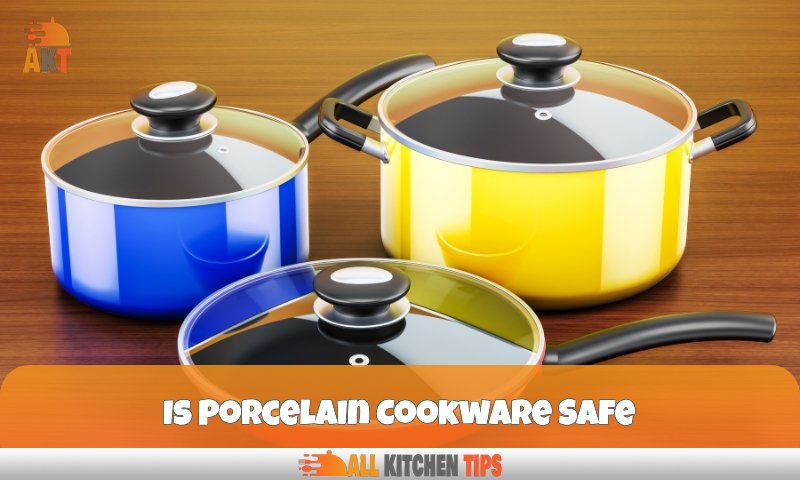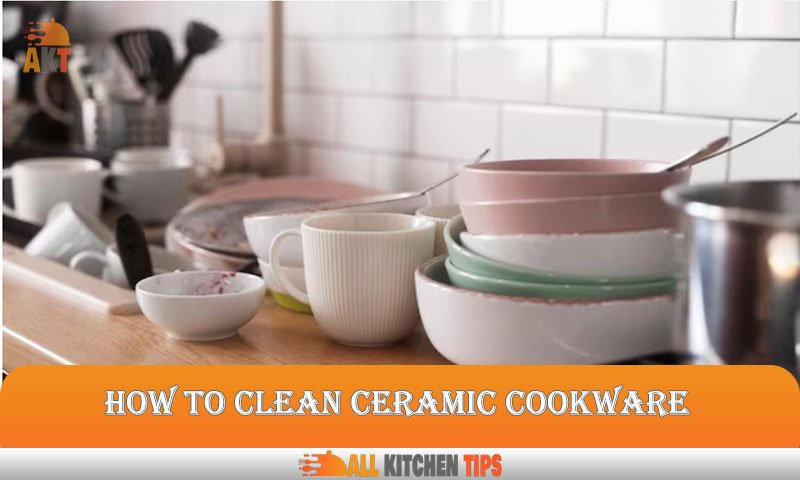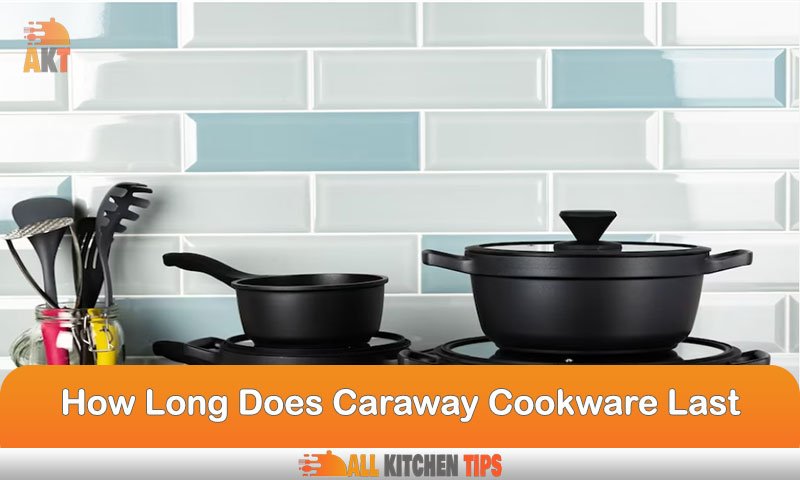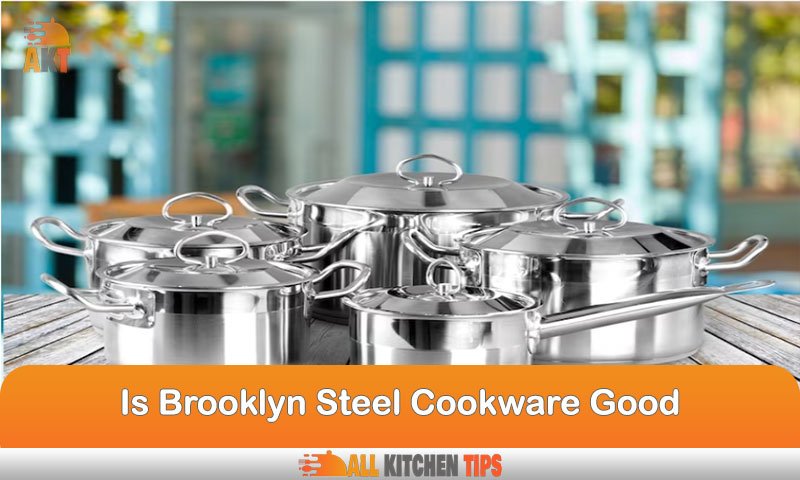Yes, porcelain cookware is considered safe for use in cooking and baking. Porcelain cookware has become a popular choice for home chefs due to its stylish look, durability, and non-stick properties.
However, when it comes to the safety of using porcelain cookware, consumers need to be aware of certain factors. One of the biggest concerns is the presence of lead and cadmium in the glaze used on some porcelain cookware. The glaze can chip off over time and contaminate food.
As a result, it’s important to choose porcelain cookware that is certified as lead and cadmium-free. Additionally, porcelain is not as heat-resistant as other materials such as cast iron or stainless steel, and porcelain cookware should not be used on high heat or under direct flame. With proper care and attention, porcelain cookware can be a safe and stylish addition to your kitchen.
Porcelain Cookware: What Is It?

If you’re looking for elegant and sturdy cookware, porcelain-coated pots and pans can be an excellent choice. Porcelain cookware is made by coating metal with porcelain enamel – a type of glass that is fused to the surface of the metal using intense heat.
Now that you know a little about what porcelain cookware is, let’s dive into the materials used, the comparison with other types of cookware, the benefits, and the safety concerns related to it.
Overview Of The Materials Used To Make Porcelain Cookware
Porcelain-coated cookware’s surface has a smooth and glossy finish that is both non-reactive and non-stick. The materials used to construct porcelain cookware include:
- Cast iron
- Aluminum
- Stainless steel
- Carbon steel
Comparison Of Porcelain Cookware With Other Types Of Cookware
Porcelain-coated cookware has several advantages over other cookware types, such as:
- Porcelain enamel does not react with food or alter its taste.
- It is easy to clean, thanks to the non-stick surface.
- Unlike other materials, it doesn’t require any seasoning before use.
- Porcelain also distributes heat evenly, preventing hotspots that can burn your food.
Benefits Of Using Porcelain Cookware
Porcelain cookware has several benefits, such as:
- Durability: The porcelain coating is resistant to chipping, scratching, and staining, making it durable and long-lasting.
- Versatility: You can use porcelain pots and pans on any stovetop, as well as in the oven.
- Non-reactive: Porcelain enamel does not react with acidic or alkaline ingredients, unlike reactive metals such as aluminum and copper.
- Non-stick surface: The non-stick surface makes cooking and cleaning much more comfortable.
Safety Concerns Related To Porcelain Cookware
Porcelain cookware is generally safe to use, and there are no significant health risks associated with it. However, there are two primary safety concerns:
- Lead in the glaze: In the past, some porcelain glazes contained lead, which can leach into food and cause lead poisoning. However, most modern porcelain cookware made today is lead-free.
- Chipping and rusting: If the porcelain coating on your cookware begins to chip, it exposes the underlying metal. Exposure to rust can cause health problems like iron poisoning, which can lead to tissue damage in severe cases.
Porcelain cookware provides an excellent alternative to traditional metals like stainless steel and cast iron. It is safe, durable, versatile, and non-stick, making it a great choice for cooking enthusiasts.
What Makes Porcelain Cookware Safe or Unsafe?

Discussion Of The Potential Safety Concerns Related To Porcelain Cookware
Are you concerned about the safety of your porcelain cookware? It’s important to understand that while porcelain itself is generally safe, some types of porcelain cookware may contain harmful chemicals that can leach into your food during cooking. Here are some potential safety concerns to be aware of:
- Lead and cadmium: Some porcelain cookware may contain lead and cadmium, which are toxic heavy metals. When ingested in large amounts, these metals can lead to serious health problems such as kidney damage, developmental delays in children, and even cancer.
- Cracking and chipping: Porcelain can crack or chip easily, especially if exposed to sudden temperature changes or rough handling. Cracks and chips can harbor bacteria and other harmful microorganisms, leading to food contamination.
Overview Of Chemicals And Toxins That May Be Present In Porcelain Cookware
To ensure the safety of your porcelain cookware, it’s important to understand the chemicals and toxins that may be present. Here are some common ones to be aware of:
- Lead: As mentioned earlier, lead is a heavy metal that can leach into food from some types of porcelain cookware. The FDA recommends that children and pregnant women avoid porcelain cookware that may contain lead.
- Cadmium: Similar to lead, cadmium is a toxic heavy metal that can cause serious health problems when ingested in high amounts.
- Arsenic: Arsenic can be present in some types of ceramic or porcelain cookware, particularly those made in areas with contaminated soil or water. While low levels of arsenic are generally safe, high levels can be toxic.
Description Of Safe And Unsafe Porcelain Cookware Practices
To minimize your risk of exposure to harmful chemicals and toxins from porcelain cookware, here are some safe practices to follow:
- Choose high-quality porcelain cookware that is certified lead-free and cadmium-free.
- Avoid using porcelain cookware that is cracked, chipped, or damaged in any way.
- Don’t use porcelain cookware on high heat settings or exposed flames, as this can cause the porcelain to crack or break.
- Hand wash your porcelain cookware with mild soap and warm water, and avoid using abrasive cleaners or scouring pads that can scratch the surface.
Explanation Of How Porcelain Cookware Can Impact Our Health
While porcelain cookware can be a safe and healthy option, certain types of porcelain may contain harmful chemicals and toxins that can leach into your food during cooking. Long-term exposure to these substances can lead to serious health problems such as kidney damage, developmental delays in children, and cancer.
By following safe practices and choosing high-quality, certified porcelain cookware, you can minimize your risk of exposure to these harmful substances and enjoy delicious meals that are free from contamination.
Remember, your health should always come first, and it’s always better to be safe than sorry when it comes to your cookware.
Porcelain Vs. Other Cookware Materials: Choosing The Safest Option
Cookware is an essential part of any kitchen, but it’s important to be mindful of the materials that you use when selecting the safest option. Different cookware materials can impact the quality, aesthetics, and even safety of your food.
Porcelain cookware has become increasingly popular in recent years, but is it safe? Let’s delve into a comparison of porcelain cookware with other cookware materials and evaluate the safety of porcelain cookware compared to other materials.
Comparison Of Porcelain Cookware With Other Cookware Materials
- Porcelain is a type of ceramic that is glazed and fired at high temperatures. It is also non-toxic, meaning that it is safe and healthy for food to come into contact with it.
- Aluminum is a popular and affordable material for cookware, but it is reactive and can cause food to discolor and have a metallic taste. It also has the potential to leach into your food if it interacts with acidic or salty ingredients.
- Stainless steel is a durable and corrosion-resistant material that is also non-reactive. However, it can be more expensive than other materials and can have hotspots on the surface which can lead to uneven cooking.
- Cast iron is a highly durable material that retains heat well and provides excellent flavor. However, it is reactive and requires seasoning before use. It can also be quite heavy and require more maintenance than other materials.
Discussion Of The Pros And Cons Of Different Cookware Materials
- Porcelain cookware is a safer and healthier option for cooking food, but it can be delicate and prone to chipping and cracking.
- Aluminum is affordable and heats up quickly, but it is reactive and can leach into food.
- Stainless steel is durable and non-reactive, but it can have hotspots and be more expensive than other materials.
- Cast iron provides excellent flavor and is highly durable, but it requires seasoning and can be heavy and difficult to maintain.
Evaluation Of The Safety Of Porcelain Cookware Compared To Other Materials
- When it comes to safety, porcelain cookware is the best option as it is non-reactive, non-toxic, and does not leach into food.
- Aluminum and cast iron can both be reactive and require seasoning, making them less desirable for health-conscious buyers.
- Stainless steel and copper-coated cookware can both have hotspots and can potentially leach into food if it is left unchecked.
Explanation Of Factors To Consider When Selecting Safe Cookware
- The material of the cookware plays a significant role in the food’s safety, so look for non-reactive materials such as porcelain and stainless steel.
- Consider the durability, weight, and price of the cookware. Porcelain and stainless steel are both durable and come at a variety of prices, making them both cost-efficient options.
- Maintenance is another important factor to consider as some materials require seasoning or regular maintenance. Porcelain and stainless steel require minimal maintenance, making them easy and convenient options.
Overall, when it comes to choosing safe cookware, porcelain is the best option. It is non-toxic, non-reactive, and does not leach into the food. While there are other materials available, porcelain cookware is the most viable option for health-conscious individuals.
When selecting cookware, consider the material, durability, weight, price, and maintenance. By prioritizing these factors, you can secure a safe and healthy cooking experience.
Tips For Using Porcelain Cookware Safely
Guidelines For Handling, Using, And Caring For Porcelain Cookware
Porcelain cookware is a popular choice for many households due to its durability, non-stick surface, and elegant appearance. However, it’s crucial to handle, use, and care for porcelain cookware safely to avoid any health risks. Here are some guidelines to follow:
- Never heat an empty porcelain pot or pan as it can lead to breakage or even explosion.
- Only use low to medium heat to cook with porcelain cookware. High heat may crack the glaze, which can cause harmful bacteria to develop, and the porcelain’s thermal shock resistance might be affected.
- Do not transfer porcelain cookware directly from the fridge to the stove, as it can crack from drastic temperature changes.
- Avoid using metal utensils on porcelain cookware as they can scratch and damage the surface. Instead, use wooden, silicone, or plastic utensils.
- Do not use abrasive sponges or harsh chemicals to clean porcelain cookware, as they can scratch or ruin the enamel’s glaze. Instead, use mild soap and a soft sponge or cloth to clean them.
- Always dry porcelain cookware carefully after washing to prevent moisture buildup.
Safe Cooking And Cleaning Practices For Porcelain Cookware

Cooking and cleaning porcelain cookware can be risky if you don’t follow the correct procedures. Here are some safe cooking and cleaning practices to consider:
- Use a small amount of oil or butter when cooking, as porcelain cookware already has a non-stick surface.
- Never store food in porcelain cookware, especially if it’s acidic or salty, as it can cause discoloration and corrosion in the long run.
- Avoid using non-stick sprays on porcelain cookware, as they can leave a residue that’s hard to remove and might cause the enamel to deteriorate.
- After cleaning, store porcelain cookware in a dry place to prevent moisture from accumulating.
- Consider using a protective coating, such as a cook’s protective ceramic coating, to extend the life of your porcelain cookware.
Description of Best Practices to Minimize Health Risks:
While porcelain cookware is generally safe, it’s essential to take certain precautions to minimize health risks. Here are some best practices to keep in mind:
- Avoid using chipped, cracked, or damaged porcelain cookware, as it can harbor bacteria and harmful chemicals.
- Always wash your hands before and after handling porcelain cookware to prevent cross-contamination.
- Select porcelain cookware that’s certified lead-free, cadmium-free, and other heavy metal-free.
- If you experience any unusual symptoms after using porcelain cookware, such as breathing difficulties, skin rashes, or burning eyes, consult a doctor immediately.
- Consider using alternative cookware materials, such as cast iron or stainless steel, if you have any allergies or sensitivities to porcelain cookware.
By following these guidelines and best practices, you can enjoy the benefits of porcelain cookware safely and minimize any potential health risks.
FAQs
Is Porcelain Cookware Safe For Daily Use?
Yes, porcelain cookware is safe for daily use as it’s non-toxic and free from harmful chemicals.
Does Porcelain Cookware Contain Lead?
No, porcelain cookware doesn’t contain lead because it’s fired at a high temperature, which eliminates toxins.
Can Porcelain Cookware Be Used On A Gas Stove?
Yes, porcelain cookware can be used on a gas stove as long as it has a flat bottom.
How to Maintain Porcelain Cookware?
To maintain porcelain cookware, clean it with mild detergent and avoid using abrasive materials.
Conclusion
After considering all the factors, we can conclude that porcelain cookware is generally safe to use. This type of cookware is made from natural materials and is free from harmful chemicals. It is also non-reactive, meaning it will not alter the taste or smell of your food.
While there are some concerns about its durability and the potential for chipping, taking proper care of your porcelain cookware can mitigate these risks. Additionally, it is important to avoid exposing porcelain cookware to extreme temperatures and to handle it carefully to prevent damage.
Overall, if taken care of properly, porcelain cookware can be a safe and aesthetically pleasing addition to your kitchen. As with all cookware, it is important to use your best judgment and take the necessary precautions to ensure the safety of yourself and your family.





